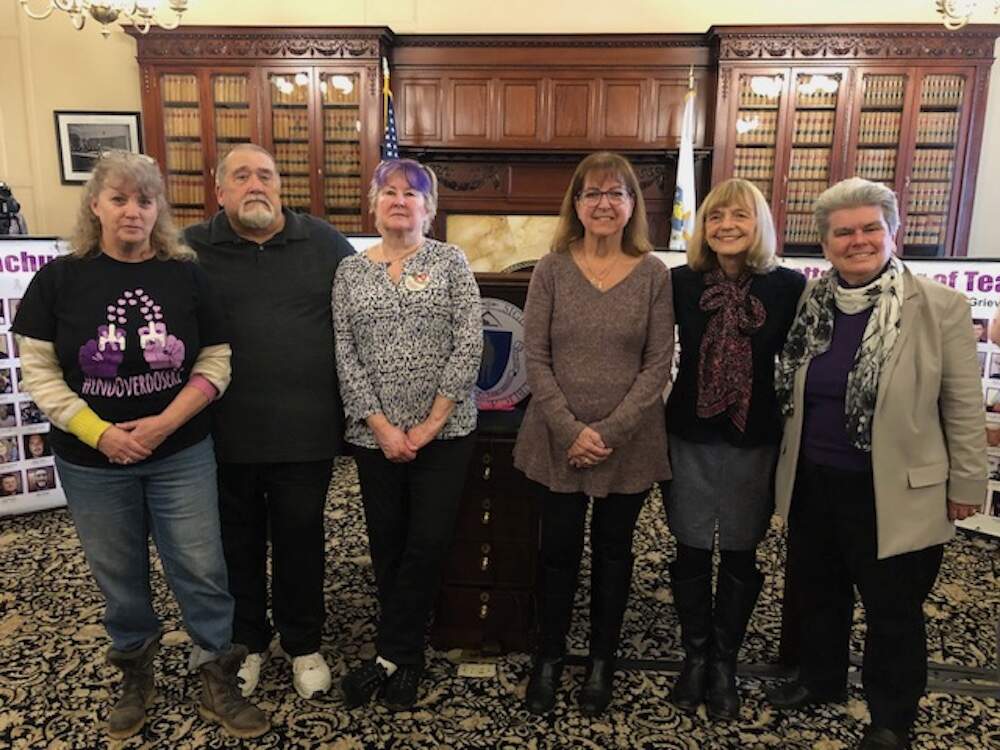Advertisement
Some parents say Mass. needs overdose prevention centers
It’s been 10 years since Massachusetts called the surge in opioid-related overdose deaths a public health emergency. Five years ago, a special commission recommended opening supervised consumption — or overdose prevention — centers to help save lives, but the state still doesn’t have any. Last year, more people than ever fatally overdosed in Massachusetts.
Some parents, whose children are addicted to opioids or suffered a fatal overdose, are urging lawmakers to change that. They gathered along with advocates at the State House Thursday to push for action on proposed legislation that would ease the creation of overdose prevention sites.
“Come on people, we can do better than this. Where is the outrage?” said Lynn Wencus, to applause from about 50 people gathered at the State House event. Wencus and five other parents spoke about what they say is an urgent need for overdose prevention centers to stop more people from dying.
“I can only wonder if my [son] Jeff would be here today,” Wencus said, echoing the sentiment of every parent who spoke. Her son was 33 when he died of an overdose in 2017.

Overdose prevention centers, where staff are trained to monitor drug use and reverse an overdose if necessary, have gained support from state health officials and major medical groups, but remain controversial across the U.S. Many critics argue that making it safer to take illegal drugs will worsen the drug crisis, not improve it. There are also legal barriers to opening such sites.
Cheryl Juaire has become an advocate for families affected by opioid addiction after losing two sons who overdosed. Both died alone, as did Jeff Wencus, with no one there to help restore breathing, perform CPR or use Narcan, the drug that can reverse an overdose. Juaire said that would not happen in an overdose prevention clinic.
“Our loved ones could walk into these centers and be treated like the human beings that they are,” said Juaire. “And for me, this is the most important part. When they are ready they are offered services such as counseling, treatment and recovery.”
Legislation that would allow supervised consumption sites in Massachusetts has been filed every session since the special commission said the state should pilot at least one. Somerville has been moving ahead with plans for a site, but organizers say it will be difficult to recruit staff unless the state passes liability protection for both clinic workers and participants.
The state Department of Public Health filed a report last month, as deaths hit a new record high, that said the state needs overdose prevention centers among other measures to reduce fatalities. Legislative leaders say they continue to spend tens of millions of dollars every year to address prevention, addiction and recovery — and are reviewing the report. Some legislators say it doesn’t make sense for the state to allow the clinics if federal prosecutors can use federal laws to try and shut them down.
Acting U.S. Attorney for Massachusetts Joshua Levy did not respond to questions about whether his office would intervene if Somerville or other cities and towns open overdose prevention centers.
Gary Carter, whose son overdosed and died in 2018, said the legislature’s inaction is costing lives. Carter said he’s spoken to medical professionals and people in recovery who are ready to work at overdose prevention sites. Instead, Carter said it feels like he’s watching a well-trained fire department bring all of the latest equipment to a blaze, and then stand by while the building burns to the ground.
“Obviously, this is not the answer,” Carter said. “Our children call out to us to make it stop.”
In the meantime, some parents are learning what’s needed to supervise illegal drug use at home and revive their children. Laurie MacDougall described sitting outside the bathroom door, begging her son to keep talking to her, so she would know he hadn’t lost consciousness. MacDougall said her son is now in recovery.
“There are hundreds, if not thousands of families out there running their own overdose prevention centers within their homes,” MacDougall said. “Let’s set people up so they can recover.”
The group Massachusetts for Overdose Prevention Centers organized the State House event. It’s a coalition that includes the state’s medical society, hospital association and leading public health groups. Coalition members said they see more momentum for passage of legislation this year in Massachusetts as lawmakers learn more about two sites that have opened in New York, and Rhode Island’s plans to open a site in the coming months.
Opponents of supervised consumption centers argue the sites encourage drug use. But all of these parents told the opposite story. The crisis is worse, they said, because Massachusetts doesn’t allow this option.
Cara Moser, one of those parents, told the group at the State House that overdose prevention centers would ease the trauma for people addicted to drugs and their loved ones. Moser’s then 14-year-old son found his older sister’s lifeless body on a couch, at home. Moser said five years later, he still struggles with the memory.
“It’s time for Massachusetts to get on board and save our families and friends from more unnecessary overdose deaths,” said Moser, her voice choked with tears.
